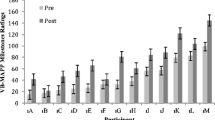Abstract
With a specific focus on children, the present paper outlines the verbal self-instruction procedures, delineates their specific relevancy for self-control problems, and briefly reviews the outcome literature. The cognitive capacity of the children, the use of contingent incentives, and issues regarding generalization are discussed. Throughout the article there is a balanced consideration of both practical guidelines and research questions.
Similar content being viewed by others
Reference Note
Robertson, D., & Keeley, S.Evaluation of a mediational training program for impulsive children by a multiple case study design. Paper presented at the meeting of the American Psychological Association, Montreal, 1974.
References
Bandura, A.Social learning theory. Englewood Cliffs, New Jersey: Prentice-Hall, 1977.
Bem, S. Verbal self-control: The establishment of effective self-instruction.Journal of Experimental Psychology 1967,74 485–491.
Birch, D. Verbal control of nonverbal behavior.Journal of Experimental Child Psychology 1966,4 266–275.
Bornstein, P. H., & Quevillon, R. P. The effects of a self-instructional package on overactive preschool boys.Journal of Applied Behavior Analysis 1976,9 179–188.
Camp, B. W. Verbal mediation in young aggressive boys.Journal of Abnormal Psychology 1977,86 145–153.
Drake, D. M. Perceptual correlates of impulsive and reflective behavior.Developmental Psychology 1970,2 202–214.
Drummond, D.Self-instructional training: An approach to disruptive classroom behavior. Unpublished doctoral dissertation, University of Oregon, 1974.
Finch, A. J., Jr., & Kendall, P. C. Impulsive behavior: From research to treatment. In A. J. Finch, Jr. & P. C. Kendall (Eds.),Treatment and research in child psychopathology. Spectrum Publications (in press).
Finch, A. J., Jr., & Montgomery, L. E. Reflection-impulsivity and information seeking in emotionally disturbed children.Journal of Abnormal Child Psychology 1973,1 358–362.
Finch, A. J., Jr., Wilkinson, M. D., Nelson, W. M., & Montgomery, L. E. Modification of an impulsive cognitive tempo in emotionally disturbed boys.Journal of Abnormal Child Psychology 19753 47–51.
Goodwin, S., & Mahoney, M. J. Modification of aggression via modeling: An experimental probe.Journal of Behavior Therapy and Experimental Psychiatry 1975,6 200–202.
Kendall, P. C. (Producer).A cognitive-behavioral treatment for impulsivity. Minneapolis: University of Minnesota, 1976. (Film)
Kendall, P. C., & Finch, A. J., Jr. A cognitive-behavioral treatment for impulse control: A case study.Journal of Consulting and Clinical Psychology 1976,44 852–857.
Kendall, P. C., & Finch, A. J., Jr. A cognitive-behavioral treatment for impulsivity: A group comparison study.Journal of Consulting and Clinical Psychology (in press).
Luria, A. R.The role of speech in the regulation of normal and abnormal behavior. New York: Liveright, 1961.
Mahoney, M. J.Cognition and behavior modification. Cambridge, Massachusetts. Ballinger, 1974.
Mahoney, M. J. Reflections on the cognitive-learning trend in psychotherapy.American Psychologist 1977,32 5–13. (a)
Mahoney, M. J. Cognitive therapy and research: A question of questions.Cognitive Therapy and Research 1977,1 5–16. (b)
Meichenbaum, D.Cognitive behavior modification. Morristown, New Jersey: General Learning Press, 1974.
Meichenbaum, D. Self-instructional methods. In F. Kanfer & A. Goldstein (Eds.),Helping people change New York: Pergamon Press, 1975.
Meichenbaum, D.Cognitive behavior modification newsletter (Vol. 2). University of Waterloo, Canada, 1976.
Meichenbaum, D.Cognitive behavior modification: A integrative approach. New York: Plenum, 1977.
Meichenbaum, D. H., & Goodman, J. The developmental control of operant motor responding by verbal operants.Journal of Experimental Child Psychology 1969,7 533–565.
Meichenbaum, D. H., & Goodman, J. Training impulsive children to talk to themselves: A means of developing self-control.Journal of Abnormal Psychology 1971,77 115–126.
Monohan, J., & O'Leary, K. D. Effects of self-instruction on rule-breaking behavior.Psychological Reports 1971,29 1059–1066.
Nelson, W. M., Finch, A. J., Jr., & Hooke, J. F. Effects of reinforcement and response-cost on cognitive style in emotionally disturbed boys.Journal of Abnormal Psychology 1975,84 426–428.
O'Leary, K. D. The effects of self-instruction on immoral behavior.Journal of Experimental Child Psychology 1968,6 297–301.
O'Leary, K. D., & O'Leary, S. G.Classroom management: The successful use of behavior modification. New York: Pergamon, 1972.
Palkes, H., Stewart, M., & Freedman, J. Improvement in maze performance of hyperactive boys as a function of verbal training procedures.Journal of Special Education 1972,5 337–342.
Palkes, H., Stewart, W., & Kahana, B. Porteus maze performance of hyperactive boys after training in self-directed verbal commands.Child Development 1968,39 817–826.
Robin, A. L., Armel, S., & O'Leary, K. D. The effects of self-instruction on writing deficiencies.Behavior Therapy 1975,6 178–187.
Siegelman, E. Reflective and impulsive observing behavior.Child Development 1969,40 1213–1222.
Spivack, G., & Shure, M. B.Social adjustment of young children. San Francisco: Jossey-Bass, 1974.
Vygotsky, L. S.Thought and language. New York: Wiley, 1962.
Weinreich, R. J.Inducing reflective thinking in impulsive, emotionally disturbed children. Unpublished thesis, Virginia Commonwealth University, 1975.
White, S. H. Evidence for a hierarchical arrangement of learning processes. In L. P. Lipsitt & C. C. Spiker (Eds.),Advances in child development and behavior (Vol. 2). New York: Academic Press, 1965.
Author information
Authors and Affiliations
Rights and permissions
About this article
Cite this article
Kendall, P.C. On the efficacious use of verbal self-instructional procedures with children. Cogn Ther Res 1, 331–341 (1977). https://doi.org/10.1007/BF01663997
Issue Date:
DOI: https://doi.org/10.1007/BF01663997




